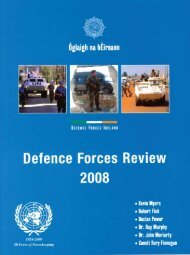Defence Forces Review 2010
Defence Forces Review 2010
Defence Forces Review 2010
You also want an ePaper? Increase the reach of your titles
YUMPU automatically turns print PDFs into web optimized ePapers that Google loves.
Mission Command: The Command Panacea?philosophy and that the leader is more important than organisational structure in enablingMC. In order for MC to be enabled, trust and initiative are required as key ingredients, whichin turn facilitate a permissive culture.Organisational Culture and StructureOrganisational culture and structure emerged as supporting pillars which underpin the humanin-command.In that context the leader is central to creating and influencing organisationalculture. This view is supported in the business world where leaders imbue their values andshape organisational culture. It has been noted that within the past decade DF culture haschanged, specifically at the middle-ranking leadership level (Commandant); and that thischange is leading toward a more receptive and participative culture. Although analysis of thechange was beyond the scope of this study, this indication could, if confirmed, act as a catalystto enabling MC philosophy, should the DF decide to adopt it as their command philosophy.PERSONAL ETHICSBELIEFS AND VALUESMORAL DEVELOPMENTETHICAL FRAMEWORKORGANISATIONAL CULTURERITUALS, CEREMONIESSTORIES, HEROESLANGUAGE, SLOGANSSYMBOLSFOUNDER, HISTORYORGANISATIONAL SYSTEMSSTRUCTUREPOLICIES, RULESCODE OF ETHICSREWARD SYSTEMSELECTION, TRAININGis decisionorbehaviourethical andsociallyresponsibleEXTERNAL STAKEHOLDERSGOVERNMENT REGULATIONSCUSTOMERSSPECIAL INTEREST GROUPSGLOBAL MARKET FORCESFigure 4: <strong>Forces</strong> that shape managerial ethics (Daft, 2007:257) 26Morality and ValuesLeading on from the themes already outlined, leaders play a pivotal role in instilling theirmorals and values into followers by setting example, educating, and establishing the rightethical and moral tone (Figure 4). In doing this, a leader’s actions and values act as a guideto deal with the uncertainty of intrinsically uncontrollable or difficult events. Nolan stressesthe essential need to instil core values into all command philosophies. Having highlighted theabsence of any formalised ethics doctrine within the DF, he goes on to underscore the need forthe DF to establish and disseminate an ethics doctrine. If the DF were to embrace MC as theircommand philosophy, Nolan’s recommendation represents one of several critical first steps.26 Daft, R. (2007) Understanding the theory and design of organisations, USA, Thomson South Western.7
















